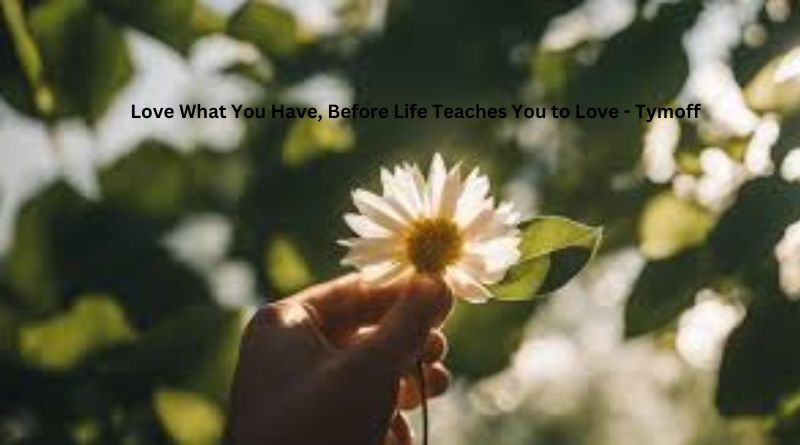Introduction
In a world constantly bombarding us with messages of consumerism and the pursuit of more, it’s easy to overlook the beauty of what we already possess. The phrase “love what you have, before life teaches you to lov – tymoff” encapsulates a profound wisdom often lost in the noise of modern life. This article delves into the importance of cherishing what we already have, exploring the deeper meanings behind this sentiment and its implications for our well-being and fulfillment.
Appreciating the Present Moment
At the core of “love what you have” lies the concept of mindfulness and gratitude. In today’s fast-paced society, it’s all too common to fixate on the future or dwell on the past, neglecting the richness of the present moment. Research in positive psychology consistently demonstrates the benefits of gratitude practices in promoting psychological well-being and overall life satisfaction. By cultivating an attitude of gratitude for the blessings in our lives, we can shift our focus from scarcity to abundance, finding contentment in the here and now.
Embracing Imperfection
One of the challenges in embracing the philosophy of “love what you have” is coming to terms with imperfection. In a world that often celebrates perfection and idealized standards, it can be difficult to appreciate the beauty in flaws and shortcomings. However, it is precisely through our imperfections that we find our humanity. Learning to love what we have, flaws and all, allows us to embrace our authenticity and connect more deeply with ourselves and others.
The Pitfalls of Comparison
Comparison is the thief of joy, as the saying goes. In the age of social media, where curated images of seemingly perfect lives abound, it’s easy to fall into the trap of comparing ourselves to others. However, such comparisons are often based on illusions rather than reality. “Love what you have” reminds us to focus on our own journey and celebrate our unique experiences and accomplishments, rather than measuring ourselves against unrealistic standards set by others.
Finding Fulfillment in Simplicity
The pursuit of material wealth and status often leads to a never-ending cycle of desire and dissatisfaction. “Love what you have” encourages us to find fulfillment in simplicity and embrace a more minimalist lifestyle. By letting go of the need for excess possessions and external validation, we can discover true happiness in the simple pleasures of life – spending time with loved ones, enjoying nature, and pursuing our passions.
Navigating Life’s Challenges
Life is full of ups and downs, and it’s during the difficult times that the wisdom of “love what you have” truly shines. When faced with adversity, whether it be loss, illness, or failure, we are reminded of the fragility of life and the importance of cherishing the moments we have with the people and things we hold dear. In the face of uncertainty, gratitude becomes a beacon of light, guiding us through the darkest of times.
Cultivating a Mindset of Abundance
At its core, “love what you have” is a mindset – a shift from scarcity to abundance. Rather than focusing on what we lack, we choose to see the abundance that surrounds us. This abundance mindset opens the door to endless possibilities and opportunities for growth and fulfillment. It allows us to approach life with a sense of optimism and appreciation, knowing that we are enough just as we are.
Conclusion
In a world that often tells us we need more to be happy, “love what you have” serves as a powerful reminder of the richness of the present moment. By cultivating gratitude, embracing imperfection, and finding fulfillment in simplicity, we can navigate life’s challenges with grace and find true happiness in the here and now. So let us heed the wisdom of these words and cherish what we have, before life teaches us to love.
Read also: check

